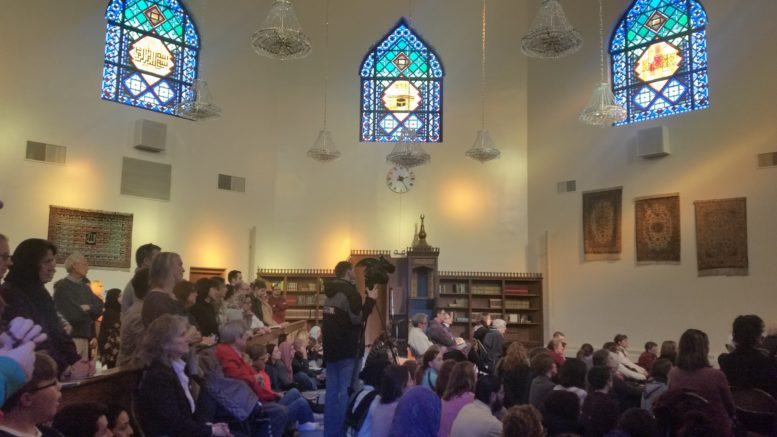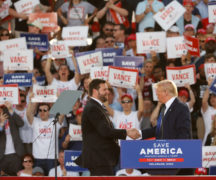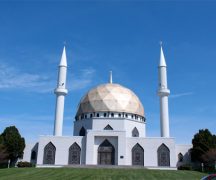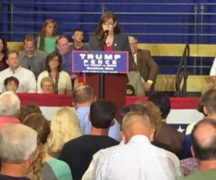By JAN LARSON McLAUGHLIN
BG Independent News
During his 35 years in the U.S., Imam Talal Eid said he has never criticized an American president.
Even during the campaign, when Donald Trump made hateful statements about Muslims, Eid held his tongue.
“He’s the president, I’m sure things will be OK,” Eid said once Trump took office.
Then came the executive order that effectively banned Muslims from seven countries from entering the U.S. And Eid, director of religious affairs at the Islamic Center of Greater Toledo in Perrysburg Township, cautioned church officials to pray for the divided nation but not criticize Trump.
But then the stories came of families separated, Muslims returned to dangerous lands, people’s lives at risk.
“I started to hear the tragedies,” Eid said. “I broke my silence. Innocent people are being harmed in the name of our nation.”
Eid spoke Sunday afternoon to a mosque crowded with members and strangers who wanted to offer their support in the face of the travel ban. The audience overflowed out of the sermon room into prayer room.
“This is the first time that I feel that my country, my president is trying to kill the morale of innocent people,” he said.
He spoke of the agony that families already go through to get entry into the U.S.
“You may not be aware that people sell their homes to come to America and have a good life,” the Imam said.
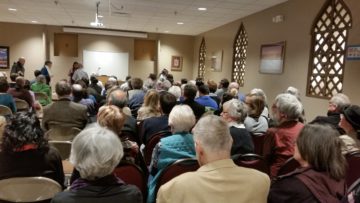
Visitors fill mosque to show support
Eid said he has always clung to the Constitution, which is guided by the belief that people are all created equal. “I always speak of the ethics of the Constitution.”
But that document appears to be under attack, as are Muslims, he said.
“Isn’t it true that Muslims are not the only immigrants,” Eid said, noting that Muslim Americans contribute to their communities. He is not opposed to measures that are truly intended to keep America safe – but this travel ban will only act as ammunition for those who hate the U.S., he said.
People being turned away from the U.S. will say, “Look what America did to me,” he said. “You are making terrorists happy. That’s what they want – to divide us.”
Eid offered a prayer for the nation, directed at Trump.
“Mr. President, I pray that God will enlighten your heart. That God will help you see the truth.”
That truth includes the fact that people from the seven countries banned by Trump’s order have not engaged in any terrorist attacks in the U.S.
Eid, from Lebanon, has long combated the portrayal of Muslims as terrorists. In 2007, he became the first Muslim cleric appointed to the U.S. Commission on International Religious Freedom by President George W. Bush.
He was joined Sunday at the mosque by Toledo Council member and former state representative Peter Ujvagi, a Hungarian-American.
“I’m a refugee. I’m an immigrant. I was a Green Card holder and now I’m a citizen of the U.S.,” Ujvagi said. He came to America with limited English speaking skills, knowing only how to say “please,” “thank you,” and how to sing “Yankee Doodle Dandy.”
Ujvagi talked about America’s history as a country of immigrants.
“None of our stories start in America. All of our stories start somewhere else,” he said.
While Ujvagi has been around long enough to see anti-immigration movements in the past, this is different, he said.
“This is the first time I’ve been afraid for our country,” he said.
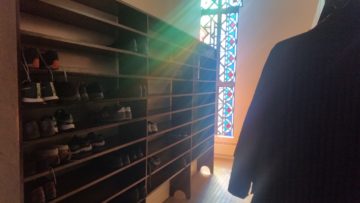
Room for shoes of mosque members
“President Trump won the election. We have to accept that,” Ujvagi said. But that doesn’t mean citizens should give up. “We have to stand up. I have to believe that America’s spirit will ultimately prevail.”
U.S. Rep. Marcy Kaptur, D-Toledo, praised those people who packed the mosque on Sunday.
“I am so proud of our community,” she said. Kaptur recalled the days following the Sept. 11 attacks, when some mosques in the U.S. were sites of violence and hatred. But the Greater Toledo mosque was instead the site of an interfaith service where people of all faiths gathered to hold hands and show unity.
“There’s a great ethic that operates in our community, and it’s priceless,” Kaptur said. “I have no doubt good will conquer evil in all of its forms.”
Many in the audience raised their hands when asked if Sunday was their first visit to the mosque.
Antonia Barry, of Clyde, brought her two daughters to the service.
“We just came to support the community. It’s under a lot of pressure right now,” Barry said. “We just wanted to be some friendly faces. We support diversity and religious freedom.”
Another woman, from Perrysburg, said it was her first time in the mosque. “With the increase in public hate, I want them to feel like they’re supported,” she said.
Chuck Kiskaddon and his wife, of Perrysburg, said their daughter was married at the mosque. They are not Muslims, but their grandson in Montreal is.
“We just felt like we need to support the community based on what’s happening,” he said.
Rev. Ed Heilman, of Park Church in Toledo, also joined to show solidarity.
“I’m a longtime supporter of building community across religions. I want to be a bridge builder, not a bridge burner,” Heilman said. “We’re all in this together.”
The support has been steadily streaming in at the mosque since the travel ban was initiated, according to Nadia Ashraf-Moghal, president of the Islamic Center.
“The phone keeps ringing,” she said. “We have always been and always will be a member of the interfaith community.”
Sunday’s gathering was not a protest, but rather a unifying rally, Ashraf-Moghal said. “We are always ready to work with you and make our country a better place. We love our country.”
As the service ended, the Imam offered a final prayer. “Bless America, and keep it a united America,” he prayed.

